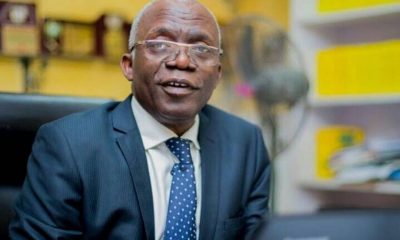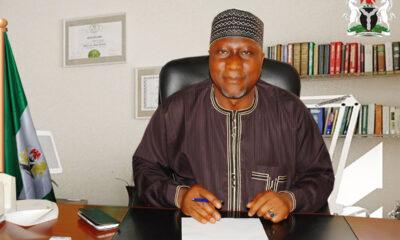Business
Nigeria’s debt of N31tn unsustainable, says LCCI

- Backs increase in electricity tariff, fuel price
- Seeks more mass transit buses, rail system
- Urges reopening of borders
The Lagos Chamber of Commerce and Industry has expressed worry about the nation’s state of economy, particularly the rising debt profile, currently put at N31tn, without corresponding output growth and economic development.
According to the LCCI, the growing level of the country’s debt is fast becoming unsustainable in the light of dwindling oil prices and production.
President of the LCCI, Toki Mabogunje, gave this position at a press conference on the state of the economy on Tuesday in Lagos.
She said the high level of debt servicing had continued to hinder robust investment in hard and soft infrastructure, described as key to stimulating productivity and improving living standards.
She said, “We note the increase in public debt stock was fueled by fresh domestic and external borrowing required to plug the wider fiscal deficit in the revised 2020 budget, given the impact of the pandemic on oil and non-oil sources of revenue.
“We also note the impact of recent exchange rate depreciation on the country’s level of external indebtedness.
“At the peak of the pandemic in the second quarter, the Federal Government received financial support worth $3.4 billion and $288.5 million from the International Monetary Fund (IMF) and African Development Bank (AfDB) respectively, while negotiations are also on-going for a cumulative $1.8 billion credit support from the World Bank, African Development Bank (second tranche) and Islamic Development Bank.
“Adding this to prospective domestic issuances could possibly push the country’s public debt stock to around N34 trillion by year-end, equivalent to 23 per cent of the GDP.”
On the nation’s accelerated inflation rate, Mabogunje said the persistent pressure on consumer prices stemmed largely from the sustained uptrend in food inflation.
She said the recent incidents of flooding in key food-producing states in the North had wiped off food and cash crops on a large scale and disrupted output projections in agriculture.
Mabogunje said that the situation, if not urgently addressed, would escalate the pressure on food prices, thereby putting the country on the verge of a food crisis.
She noted, “According to local media reports, over two million tons of rice were lost to flood; other crops such as sorghum, corn and millet were also affected.
“Rising inflation trajectory has serious implications for businesses regarding production cost, investment real return rate, and overall economic performance.
“Looking forward, the Chamber expects inflation to sustain its upward trajectory for the rest of the year.
“The Lagos Chamber calls on the fiscal and monetary authorities on the need to synergise to moderate domestic prices to a level conducive for sustainable and inclusive economic growth.
“The Federal Government might need to reopen the land borders to give succour to food prices in the light of lower domestic food supply amid huge demand for food.
“Similarly, both the federal and state governments also need to promptly address the issue of food wastage, majorly responsible for the food supply gap being experienced in the country.”
The LCCI president also advised policymakers on the formulation and implementation of policies to facilitate sustainability as business operators grapple with the devastating impact of the COVID-19 pandemic.
Mabogunje said such policies must support businesses, protect jobs, preserve investment and foster economic competitiveness at both national and subnational levels.
She said the chamber endorsed the adoption of the cost-reflective tariff regime in the power sector.
The LCCI president said the new tariff would attract investment and improve power supply, even as she noted that safeguards were needed to protect consumers from exploitation.
She said, “If the economics of the investment is not right, investors will not inject capital into the sector. However, there should be safeguards to protect consumers from exploitation.
“There should comprehensive metering of consumers and there should be value for money. We believe that policy should be given a chance.”
The LCCI president said the Solar Home Initiative, aimed at expanding energy access to 25 million individuals through the provision of solar home systems or connection to a mini grid was a step in the right direction.
She said the initiative would stimulate growth and productivity in the country’s rural economy.
Mabogunje also commended government on the recent reforms implemented in the downstream segment of the oil sector.
She said the removal of petrol subsidy and the proposal by the Nigerian National Petroleum Corporation to give up majority stakes in the four local refineries were laudable.
Mabogunje, however, appealed for the provision of mass transit buses, development of rail system for intra city and intercity transportation, and the acceleration of the auto gas programme so that more vehicles could be powered by gas.
She said, “We believe these measures are steps in the right direction in rescuing the economy from deepening fiscal crisis.
“We note that the subsidy regime had for long constituted a huge burden on public finances, encouraged corruption, inefficiencies, deterred investment flows, and weakened the earnings performance of oil refining and marketing companies.
“We acknowledge the effect of the price hike on the vulnerable segments of the society. Accordingly, we request that palliatives be provided in form of mass transit buses among other initiatives to ease the burden on consumers.”
Mabogunje also called for the expeditious passage of the Petroleum Industry Bill to consolidate recent reforms in the sector.
On the various fiscal and monetary interventions by the government, Mabogunje said the schemes would help with fulfilling payroll obligations and protect the jobs within the SMEs sector.
She said, “The Lagos Chamber acknowledges the various interventions of the fiscal and monetary sides of authorities in mitigating the adverse impact of the pandemic on economic and business environment.
“The federal and state governments need to expeditiously redirect attention to these sectors, including aviation, hospitality, entertainment, and manufacturing.
“This has become necessary to protect jobs, preserve investments and provide the much-needed liquidity required to revive these sectors.”
The LCCI president said the chamber noted the weak performance of the economy at the sectoral level, particularly among key sectors with potential to drive economic diversification.
Mabogunje said the 6.1 per cent contraction of the Gross Domestic Product in the second quarter reflected the profound impact of the pandemic on the economy.
She said the Chamber anticipated a marginal improvement in the GDP growth performance by the third quarter.
She attributed the anticipated improvement to the declining trend in the rate of confirmed cases of COVID-19, relaxation of various containment measures and the increasing tempo of economic activities.
On foreign exchange, the LCCI President said inappropriate forex policies could discourage fresh capital inflows on foreign direct investment, portfolio investment, remittances, and non-oil export proceeds into the economy.
Mabogunje said this was evidenced by the sharp plunge in the level of capital imported into Nigeria from $5.9 billion in the first quarter to $1.2 billion in the second quarter, partly caused by the capital control policy of the Central Bank of Nigeria.
She said, “The Chamber notes the various policy measures taken by the Central Bank of Nigeria to conserve the country’s foreign exchange resources in the light of weakening dollar inflows precipitated by the global pandemic.
“While the Lagos Chamber appreciates the efforts of the apex bank in preserving the scarce foreign exchange resources at a time the economy is confronted with the twin challenge of lower oil price and production, we believe demand management strategies alone are not sustainable solutions to the recurring foreign exchange crises.”
Auto
Luxury bus owners: Count us out of planned mass protest

Luxury bus owners: Count us out of planned mass protest
Long distance road transport owners and operators whose buses ply various routes across Nigeria have dissociated themselves from the ‘Days of Rage’ nationwide protests planned to commence on Thursday, August 1, 2024.
The transporters under their national umbrella body, Association of Luxury Bus Owners of Nigeria (ALBON), disclosed this at a press conference in the Utako area of Abuja on Thursday.
They described the planned protests as an ill wind that would blow anybody no good.
Briefing the press on ALBON’s position after a meeting in their Abuja office, the association’s leadership led by the President, Mr. Nonso Ubajaka, said experience had shown that such protests are usually infiltrated by hoodlums using the opportunity to unleash violence.
He said members reasoned that if held, the protests could lead to loss of lives and wanton destruction of properties.
He said the resolution of the members of his association had been conveyed to the Minister of Transportation, Senator Said Ahmed Alkali, making it clear that they would not be a part of the planned protests.
The association acknowledged that there is economic hardship in the country, with Nigerians feeling the impact of rising food prices and high cost of living.
The ALBON leadership, however, urged those planning to protest to have a rethink and seek more peaceful ways of getting the government to address the problems, including making themselves available for peaceful dialogue.
The ALBON president drew attention to the fact that members’ vehicles operate from Utako to other parts of Nigeria, as well as from other cities and towns to various destinations across the country, which could make their vehicles vulnerable.
Ubajaka said ALBON members could not afford to risk making their buses the targets of violent protests.
He sued for meaningful dialogue while the government works towards finding solutions to the identified problems.
He said, “We don’t want to put our businesses at risk and expose the lives of the people we serve to danger through protests.
“The government has taken steps to mitigate the several national challenges that we are having.”
He called on ALBON members to disregard the planned action, which he continually referred to as a product of “social media” resolve.
Business
Nigeria’s debt service ratio drops from 97% to 68% – Finance minister

Nigeria’s debt service ratio drops from 97% to 68% – Finance minister
Nigeria’s Finance and Coordinating Minister of the Economy, Wale Edun, on Thursday, reported a dramatic drop in the debt service ratio from an alarming 97 per cent in June 2023 to a more sustainable 68 per cent in 2024.
Addressing a press conference on the economy’s half year performance in Abuja, Edun asserted that the reduction allows the government to redirect funds to essential sectors such as infrastructure, education, healthcare, and social services, thereby improving credibility with investors and international financial institutions.
The Minister also noted a decline in Nigeria’s total debt, both domestic and foreign dollar-denominated debt fell from $181 million to $98 million, attributed to timely payments to contractors and the government’s exit from the Ways and Means financing scheme.
He added that the Federal Government’s economic policies over the past year have started yielding positive outcomes.
Edun highlighted an extraordinary 30 per cent growth in non-oil income, surpassing last year’s performance and exceeding budget expectations for the first half of 2024. He emphasized the government’s commitment to diversifying revenue sources beyond oil through robust tax reforms aimed at doubling government revenue as a percentage of GDP, from approximately 14-15 per cent to around 25 per cent.
He outlined strong measures to improve revenue collection, including technological advancements and process optimization within revenue-generating agencies. While oil revenue remains significant, its share of gross revenue has decreased to 30 per cent, down from 41 per cent during the same period last year.
READ ALSO:
- DSS recovers 2,000 bags of government-donated rice in Kastina
- DSS: There are plans to use mass protest for govt change
- INEC uncovers plan to disrupt Edo elections using ESSN operatives
To attract investments from Nigerians abroad, the Minister revealed that plans were afoot to issue a $500 million bond within the next four weeks.
The initiative aims to encourage diaspora Nigerians to bring their funds back home for investment, contributing to economic growth.
Edun acknowledged the hardships faced by Nigerians due to reform policies but assured that the benefits of these reforms will soon be realized. He stressed that President Tinubu prioritizes reducing food prices across the country and is deeply concerned about the welfare of ordinary Nigerians. After resolving transparency issues, the Cash Transfer Programme within the Social Investment initiative has resumed, recently covering approximately 600,000 beneficiaries.
He presented evidence of the economy turning a positive corner and noted that macroeconomic stability was becoming evident, with stable exchange rates, a reducing budget deficit, and a positive trade balance.
He added that investment flows are also positive, and there has been a comprehensive reconfiguration of federal finances to boost revenue and control expenditure.
Despite global economic challenges, Nigeria’s economy grew faster in the first quarter of 2024 compared to 2023. The growth was broad-based, spanning agriculture, industries, and services. Agricultural growth, which was negative in the first quarter of 2023, showed modest growth in the first quarter of 2024. The industrial sector grew seven times faster than in Q1 2023.
Edun noted that while inflation persists, the annual growth rate of inflation is slowing. Although there was a slight uptick in June due to seasonal factors, the overall trend indicates progress towards reduced inflation.
Edun concluded by expressing satisfaction with the well-coordinated fiscal and monetary policies, which are beginning to bear fruit. He emphasized that these policies are paving the way for sustained economic growth and stability, ultimately benefiting all Nigerians.
Nigeria’s debt service ratio drops from 97% to 68% – Finance minister
Business
Meta cracks down on ‘Yahoo Boys’, deletes 63,000 accounts

Meta cracks down on ‘Yahoo Boys’, deletes 63,000 accounts
Meta Platforms Inc., the parent company of Facebook, Instagram, and WhatsApp, has removed 63,000 accounts associated with the notorious “Yahoo Boys” scam group, the company announced in its Q1 2024 Adversarial Threat Report on Wednesday.
The accounts, deleted over the past few weeks, were used for financial sextortion scams and distributing blackmail scripts. Meta reported that a smaller network of 2,500 accounts, linked to around 20 individuals, primarily targeted adult men in the United States using fake identities.
Meta said it identified and disabled these accounts through a combination of advanced technical signals and comprehensive investigations, enhancing its automated detection systems.
“Financial sextortion is a borderless crime, fueled in recent years by the increased activity of Yahoo Boys, loosely organised cybercriminals operating largely out of Nigeria that specialize in different types of scams,” the social media giant stated.
It added, “We’ve removed around 63,000 accounts in Nigeria attempting to target people with financial sextortion scams, including a coordinated network of around 2,500 accounts.”
“We’ve also removed a set of Facebook accounts, Pages, and groups run by Yahoo Boys—banned under our Dangerous Organizations and Individuals policy—that were attempting to organize, recruit and train new scammers,” the company explained.
READ ALSO:
- Tinubu welcomes ex-Senate President Anyim into APC
- Customs seize vehicles illegally taking large amount of fuel to Cameroon
- Illegal petroleum storage facility discovered in Lagos
During the investigation, Meta said it found that most scammers’ attempts were unsuccessful, though some had targeted minors. These cases were reported to the National Center for Missing and Exploited Children.
Meta revealed that it also shared information with other tech companies via the Tech Coalition’s Lantern program to help curb these scams across platforms.
Further, the parent company of Facebook said it removed around 7,200 assets in Nigeria, including 1,300 Facebook accounts, 200 pages, and 5,700 groups that were providing scam-related resources.
These assets were found offering scripts and guides for scams and sharing links to collections of photos for creating fake accounts, it expounded.
Since this disruption, Meta’s systems have been actively blocking attempts from these groups to return, continually improving their detection capabilities.
The company noted that it has also been working closely with law enforcement, supporting investigations and prosecutions by responding to legal requests and alerting authorities to imminent threats.
The social media giant stated that its efforts extend beyond account removal.
“We also fund and support NCMEC and the International Justice Mission to run Project Boost, a program that trains law enforcement agencies around the world in processing and acting on NCMEC reports.
Meta cracks down on ‘Yahoo Boys’, deletes 63,000 accounts
-

 News3 days ago
News3 days agoNLC can’t withdraw from protest it didn’t organise – Ajaero
-

 News3 days ago
News3 days agoNorthern group attacks Reps Minority Caucus for demanding Nnamdi Kanu release
-

 News3 days ago
News3 days agoMinimum wage: Akpabio says domestic workers can’t earn less than N70,000
-

 News3 days ago
News3 days agoFG unveils training programme for 1,000 Nigerians in AI, blockchain
-

 International17 hours ago
International17 hours agoNetanyahu, Biden hold talks over tense Gaza ceasefire
-

 News3 days ago
News3 days agoFalana to FG: Threatening Nigerians won’t stop mass protest
-

 metro1 day ago
metro1 day agoNERDC Executive Secretary Prof Ismail Junaidu slumps, dies
-

 metro3 days ago
metro3 days agoPastor remanded for allegedly defiling teenager, attempting abortion














You must be logged in to post a comment Login